Assistance Dogs For Kids With Autism
Most of us have heard of the important work done by the non-profit organization Guiding Eyes for the Blind, but did you know they also have a program called Heeling Autism? It is designed to train and match assistance dogs with children who have autism.
What is autism?
Autism is a poorly-understood spectrum of disorders characterized by language delays, problems with communication, and unusual behavior. Autistic children usually have a high level of stress, possibly due to their inability to communicate their feelings and their difficulty in relating socially. Autistic children may engage in repetitive self-stimulating behaviors such as banging their heads against the floor or picking at their skin.
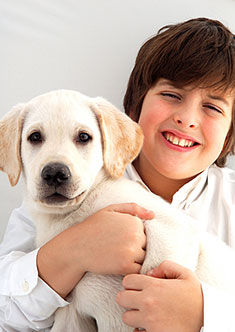
According to the Mayo Clinic, people who suffer from autism have trouble making eye contact, they may not respond to their name, and they may have an aversion to cuddling or being held. They may repeat words or phrases over and over without understanding what they mean. They are often disturbed by changes in their routine and may have trouble processing sensory input. For example, they may resist wearing certain items of clothing because they don't like the way the clothing feels.
One of the most troublesome aspects of autism is that children with the disease have a tendency to have meltdowns when stressed, and will often bolt to escape situations where they feel overwhelmed. According to the Centers for Disease Control and Prevention, about one of every 110 people in the United States suffers from the disorder, which is normally diagnosed in early childhood. Autism is more common in boys than in girls, and children who suffer from developmental delays or who have siblings with autism are at a higher risk of developing the disease.
Although there is no cure for autism, early intervention in the form of occupational therapy, speech therapy, and behavioral therapy can help ease the symptoms. Medications such as anti-psychotics and anti-depressants may also be helpful.
How can a dog help an autistic child?
Not surprisingly, having an assistance dog can help an autistic child feel calmer. Studies have shown that the child's level of the stress hormone cortisol is reduced when an assistance dog is brought into the home of a child with autism.
In numerous studies, the children's families also reported that the children were better able to handle social situations with the help of assistance dogs. These specially-trained dogs helped the children achieve a level of independence and confidence that would likely never have been possible without assistance animals.
One of the problems for autistic children is that they are often rejected by their peers. Having a dog with them in school and in other social situations can provide a topic of conversation and a bridge between the autistic child and his typically-developing peers. The dogs are also trained to nudge the children when the dogs notice repetitive behaviors. This small trigger may be just enough to get the children to re-engage socially or in class.
Most importantly, assistance dogs help the family of an autistic child keep the child safe. When the child begins to have a meltdown, the dog may help comfort the child to prevent him from hurting himself. In addition, because the dog is tethered to the child, it becomes impossible for the child to bolt, as the dog simply lies down if the child tries to run away.
What breeds of dog are used for autism assistance?
Obviously, the dog must be fairly large in order to keep the child from bolting simply by lying down. In addition, the animal must be calm and even-tempered enough to put up with any of the child's meltdowns that cannot be averted. Currently, the program uses Labrador and Golden Retrievers.
One Family's Story
In her short story, "Gifts from Shade" the parent of an autistic child named Danny relates how the dog contributed to play time with her son.
"Shade has joined Danny on wheelbarrow rides, down slides at the playground and even on a see-saw (Danny going up and Shade going down!). For a child who often will wander or play alone, Shade's constant companionship is a wondrous and most joyous gift."
She also speaks to the safety concerns Shade has helped her resolve.
"Since Danny's diagnosis, I was living with a constant fear that I would lose Danny and that he would wander away. I was on constant watch, everywhere I went I worried that he could be gone at any second. Now I know that I have an extra set of eyes on him and four extra legs. I can do the "typical shopper" things like read a label, search for a product or wait in a line. It is hard to explain what a gift this is, because most people take this for granted. I can watch my daughter's soccer game with full attention. I can have a conversation with a friend that I bump into out in public. For a parent with a child on the autism spectrum, being away from the security of home is a very stressful occurrence…not anymore for us."Read the complete story.
Heeling Autism's program
Guiding Eyes for the Blind launched its Heeling Autism program in 2008. By late 2009, they had provided nearly 20 dogs to autistic children and their families. They cite four important effects a trained assistance dog can have on an autistic child and his or her family:
- social acknowledgment of the child by his or her peers
- companionship
- reduced parental stress
- increased independence, confidence, and social acceptance for the child
Applications for this program are available only by phoning 914-243-2228 or emailing [email protected].
How can you help?
The program is always in need of homes willing to foster and socialize young puppies in preparation for entering the program. Volunteers across twelve states help in raising puppies and preparing them to be assistance dogs. More information can be found on the Guiding Eyes for the Blind's website.
To make a financial contribution to Heeling Autism, email [email protected] or phone 914-243-4340.
Doggies Den: Latest Articles
 Homemade Thanksgiving Treats for Your Dog
Homemade Thanksgiving Treats for Your Dog
NUTRITION We all want to include our dogs in our holiday celebrations, but hopefully, you're aware that sharing table scraps with your dog isn't always the best idea.
 Keeping Your Dog Safe during the Summer Months
Keeping Your Dog Safe during the Summer Months
HEALTH Summer is coming on fast, so it’s time to plan how you will keep your dog safe and healthy through the lazy, carefree, warm days.
 Vaccination Time Again-Keeping Your Puppy Healthy
Vaccination Time Again-Keeping Your Puppy Healthy
DOG HEALTH So you have your new puppy picked out. There are quite a few shots, treatments and examinations that will keep the newest member of your family healthy.
 Canine Thanksgiving Feast
Canine Thanksgiving Feast
NUTRITION With the wide variety of food at Thanksgiving dinner, chances are you'll want to give your dog something special, too. If you're contemplating what to feed your dog for the holiday, here is a guide to a great Canine Thanksgiving Feast.
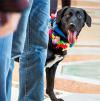 Dog Walking Tips Every Owner Should Know
Dog Walking Tips Every Owner Should Know
DOG FUN Walking your dog is not only crucial to keeping him healthy and happy, it strengthens the bond between your canine friend and his caregiver. There are a lot of obstacles out there. Don’t forget these simple tips to keep your walk fun and safe in the outside world.
 The Benefits of Physiotherapy for your Dog
The Benefits of Physiotherapy for your Dog
HEALTH The same techniques that physiotherapists use to treat a variety of injuries and conditions in humans have been adapted to suit animals with great success. Family pets, show dogs, and working dogs can all benefit greatly from physiotherapy. Dogs whose activities involve a lot of agility are especially susceptible to the types of problems that physiotherapy can address.
 The Decision- Adding a Dog to Your Family
The Decision- Adding a Dog to Your Family
FIRST TIME OWNERSBringing a dog into your family is a decision where many people don’t realize it’s magnitude until after they have the dog. There are a number of things that you need to research before you decide to purchase a dog, and it starts right in your own home.
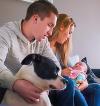 Bringing Your Dog Into Your New Baby's Life
Bringing Your Dog Into Your New Baby's Life
HEALTH Many believe that a dog and a new baby cannot happily coexist, so therefore the dog has to go. This is not necessarily the case.  A new baby does not mean you have to abandon your dog.

Doggies Den:
Most Popular Articles

Dog Pregnancy Symptoms
HEALTHIf you suspect your dog might be pregnant, check out part one in this series on pregnant dogs, where we cover pregnant dog symptoms.

Dog Birth
HEALTHIn the third article of our dog pregnancy series, we look at the wonderful, but messy, process of bringing newborn puppies into the world.

Indoor Dog Potties
DOG PRODUCTSIt's been a long day at work. You were so busy, you didn't even take time to eat a sandwich, let alone run home to let your dog out. You're on your way home, knowing the poor dog is crossing his or her legs by now, when your car breaks down, delaying you even further. Can't somebody make this easier?

Your Dog’s Digestive System
PHYSIOLOGYEver wonder why your dog eats so fast? Or why he eats gross things? Or why he gets sick to his stomach? Or why his waste stinks so bad? Some of these things are normal, some are not.

Canine Respiratory System
BREATHINGThe basic function of your dog's respiratory system is to bring oxygen in to and remove carbon dioxide from the body. Knowing the symptoms of respiratory diseases can help you help your stay healthy.
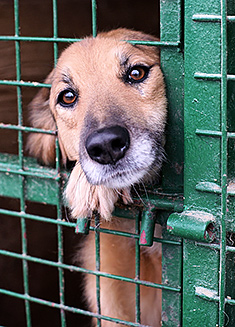
Shelter Dog Adoption Tips for Success
ADOPTION Are you intimidated by the prospect of "rescuing" a dog from a shelter? One reason that you may be wary of adopting a dog from a shelter is not knowing how to choose. Adopting a dog from a shelter can be a rewarding process, if you're prepared to do a reasonable amount of research.
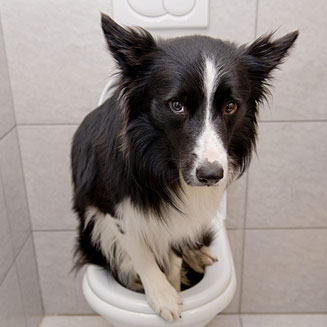
Canine Urinary Tract Infections
SYMPTOMS AND TREATMENTDoes your dog seem to be having trouble relieving his or her bladder? Learn how to recognize the signs of urinary tract infections and how to treat them before they spread.

What to do for Dog Diarrhea
SYMPTOMS AND REMEDIESIf you have dogs in your house for any length of time, you have likely experienced at least one bout of dog diarrhea. Beyond the pain in the tuckus involved in cleaning up the mess, you should know what causes diarrhea, and when it's important to see the vet.

What to do for a Dog Bite
DOG BEHAVIOR Getting bitten by a dog can be scary, and you may be tempted to run around in circles for a while, trying to figure out what to do. Here's our guide to help you manage the situation.
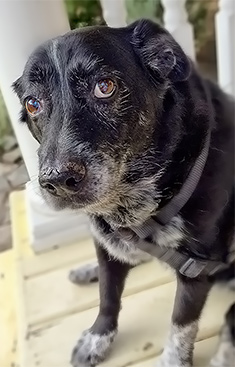
Top Ten Tips for Living with a Senior Dog
DOG HEALTH Bringing home a new puppy is so exciting, but it doesn’t take all that long for your exuberant puppy to grow into a senior dog who may have special needs. Here are the doggies.com top ten tips for taking care of your companion who has been with you through so much.
